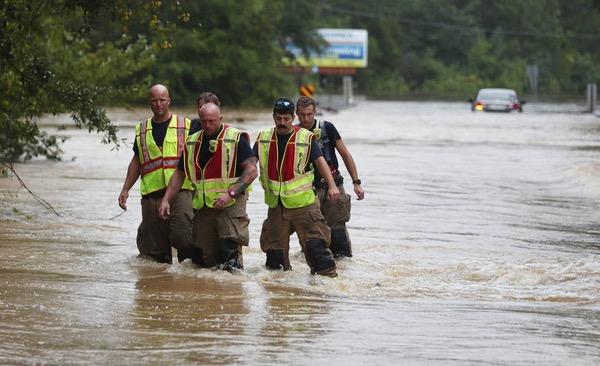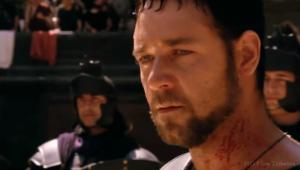Protecting Your Gear From Natural Disasters

Roughly 60-100 miles or so west of here, throughout coastal Mississippi, Alabama, and northwest Florida, there was serious flooding and widespread damage as the ground couldn’t absorb the rainfall fast enough. Pensacola, FL was hard hit (photo above). Thankfully, loss of life was low (limited to one person by the latest estimates I’ve seen) but a full recovery will be slow in the hardest hit areas..
Flooding was also forecast for my area, but luckily only an inch or two of water approached within 15 feet of my ground-level house. But for an audio/video fan that can be nail-biting. As I’ve done a few of times before, I moved the most vulnerable pieces of gear out of the way as much as possible just in case. Unfortunately, that involved tearing down much of my A/V system, which I’m only just getting reinstalled. The TVs and some of the front-end equipment are all at least 18 inches off the floor, but my power amps sit on the floor, so I moved them to the top of a kitchen island. Luckily I had recently returned the Outlaw amp I discussed in my last blog. No way was I going to lift that 100 lbs. monster up that high. Heavy speakers can be hard to protect, particularly my three pair of floor-standers. But only the regularly used Monitor Audio Silver 10s are new enough to be a serious concern. There was little I could do to protect them, but I did move them away from windows and raised them a few inches off the floor in case of minor, floor-level water intrusion. Had there been a risk of water leakage through the roof, I would have covered each of them with a large plastic garbage bag. I also have several small tarps that could have been pressed into service if needed.
The most significant impact in my area was a loss of power. Some friends lost it for 2-3 days. Businesses in town had odd disruptions, sometimes with one store open while another was closed next door. I was lucky in that I only lost power for 14 hours, ten of them during the day. If you’ve ever lost power for that length of time you know it’s a frustrating experience. I don’t wish to have it repeated (with sympathy for our CA readers who often endure rolling blackouts—but in that case they’re man-made). After a few hours food spoils in the fridge, and air conditioning shuts down (not a small thing in a Florida summer, but luckily Sally brought somewhat cooler air with her). But it was an object lesson on how important electricity is to our lives. Even during that brief shutdown, every time I walked into a dim or dark room I reflexively turned on a light switch with, of course, no response.
If there’s a point to this long-winded introduction it’s to get you thinking about preparation for natural disasters. If you know it’s coming, which you always do with a hurricane, you have some time as I did. In addition to some of the ideas presented above, make sure you power down and unplug all your pricey A/V gear (plus your computer and computer-related devices such as routers, modems, and printers). This is not only in anticipation of a possible power outage, but also to protect your equipment from surges that can occur when power is restored.
Thunderstorms can be a concern during a hurricane, and lightning strikes can damage gear. In addition to unplugging the gear, also unplug any connection to plugged-in equipment. In my case the latter was a cable box. I left it on because it takes an annoyingly long time to reset when turned back on, but I unplugged the HDMI connection between it and my TV. If there’s a way for lightning surges to get into your gear, they’ll find it. And a thunderstorm is a hazard even without a hurricane. Florida is prone to them, and even apart from hurricanes I average unplugging everything at least once a week. And don’t count on a surge protector to save you. They’re not a bad investment, but none of them are likely to stand up to a nearby lightning strike.
In addition to fire, those living in California and other parts of the Pacific coast have another issue to contend with: earthquakes. You can’t anticipate them, and keeping everything disconnected all the time when not in use, just in case The Big One hits, isn’t practical. And if San Andreas the event resembles San Andreas the movie your AV gear will be the least of your worries. But if it’s more typical of recent quakes, there’s a lot you can do to be prepared. Make sure that any table-mounted TV is secured to the wall behind it with safety straps. Secure bookshelves to studs in the wall, not just to the sheetrock or plaster. And if you’re hopelessly paranoid like me, run bungee cords across the front of open bookshelves to secure books, video discs, LPs, CDs, and other valued possessions you don’t want to retrieve from the floor (or another room!) after the quake. And though it’s impractical to permanently fasten your electronics to their shelves, museum putty (Blu-tak and similar) placed under the feet of AVRs and disc or game players might keep them from bouncing off onto the floor. Ditto for bookshelf speakers on stands, but even then don’t assume that top-heavy speakers on stands won’t topple over. Just be aware that it can be a chore to free the gear from the putty when you need to move it!. (Clue, lift at a slight angle and apply gentle but steady upward force.)
Always put the heaviest items on the bottom shelves of an equipment rack to keep it from toppling over in a jolt, or at least to minimize the chances of that happening. And make sure that the rack itself is sturdy. More than a few upscale equipment racks attach each shelf to the one below it via spikes that rest in indentations in the corners of the lower shelf. It’s an elegant (and often pricey) attempt to dissipate vibrations. Maybe that works, maybe it doesn’t. But in a strong quake, or perhaps even a modest one, the spikes, held in place only by the weight of the shelves and equipment, could jump out of their indentations and have the entire structure come crashing to the floor, taking your expensive gear along with it.
Hopefully the above will get you thinking about other possible precautions. And don’t count on insurance to cover everything. Many insurance policies have exemptions written into their coverage, such as for floods and earthquakes. When I lived in California I took out optional earthquake coverage, which doubled the cost of the policy. You’ve spent big bucks to build that system, and don’t want to have to start again from scratch. Nothing can guarantee you won’t lose it all in a natural disaster, but early preparations can’t hurt.





























































